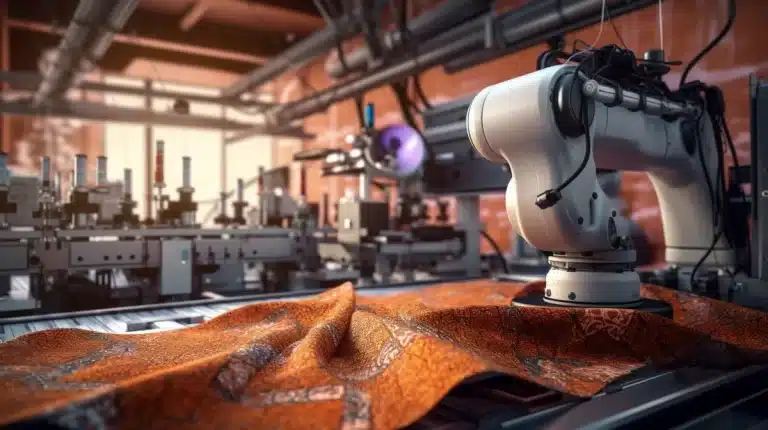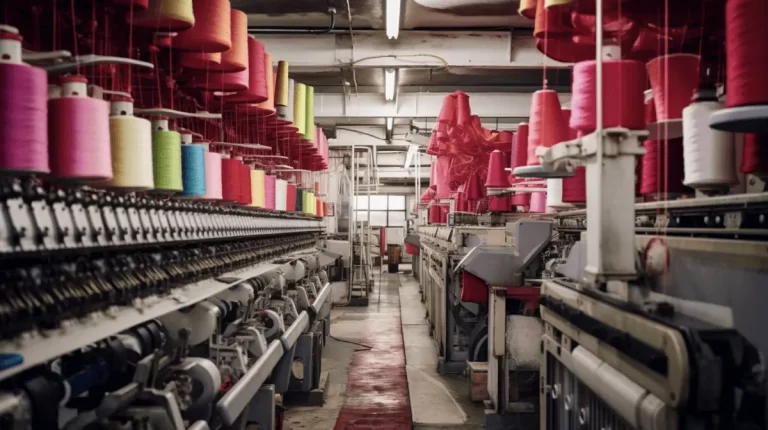The textile and apparel industry is increasingly embracing artificial intelligence (AI) to streamline processes and improve overall efficiency.
AI technology has the potential to revolutionize the industry by automating various tasks, enhancing quality control measures, and optimizing the production process.
This article will explore the role of AI in the textile and apparel industry, its transformative impact, the benefits it offers, as well as the challenges and considerations that come with its implementation.
What is the role of artificial intelligence in the textile and apparel industry?
Automating processes in the textile and apparel industry
One of the significant benefits of AI in the textile and apparel industry is its ability to automate cumbersome and time-consuming processes.
AI algorithms can analyze large amounts of data in real-time, enabling fashion companies to make data-driven decisions and stay ahead of the competition.
With AI-powered automation, tasks such as inventory management, order processing, and product assembly can be streamlined, leading to increased efficiency and reduced costs.
Improving quality control with AI
Another critical application of AI in the garment industry is enhancing quality control measures. AI technology can be used to detect and eliminate defects, ensuring that only products of the highest quality reach customers.
By analyzing sensor data and using machine learning algorithms, AI can identify potential defects during the production process, enabling manufacturers to take corrective actions promptly.
This ultimately reduces customer complaints and product returns, enhancing brand reputation.
Enhancing the production process with AI
AI algorithms also play a vital role in optimizing the production process in the textile and apparel industry. By harnessing the power of AI, fashion companies can create new designs with generative algorithms, leading to unique and innovative products.
AI can analyze consumer preferences and market trends to generate design options that cater to different segments of the market.
Moreover, AI-powered machines can automate various stages of production, reducing the need for manual labor and increasing overall productivity.
What are the benefits of using AI in the garment industry?
Reducing defects and maintaining high quality
AI-powered quality control software can significantly reduce defects in the garment industry.
By analyzing sensor data and utilizing machine learning algorithms, AI can detect potential defects during the production process and take corrective actions promptly.
This results in a higher-quality end product, reducing customer complaints and ultimately enhancing brand reputation.
Reducing waste and increasing sustainability
AI can help reduce waste in the garment industry by optimizing material usage and production processes.
Through AI-powered algorithms, manufacturers can accurately forecast demand and adjust production accordingly, reducing excess inventory and minimizing waste.
Additionally, AI can identify areas of improvement in the production process, enabling manufacturers to adopt more environmentally friendly and sustainable manufacturing practices.
Improving customer shopping experience with AI
AI can enhance the customer shopping experience by providing personalized recommendations and improving overall customer service.
By analyzing customer data and preferences, AI algorithms can recommend products that align with individual tastes and preferences.
This not only increases customer satisfaction but also encourages repeat purchases and brand loyalty.
What are the challenges and considerations for AI in the textile and apparel industry?
Handling large amounts of data with AI
One of the challenges in implementing AI in the textile and apparel industry is handling and analyzing large amounts of data.
With the increasing use of IoT sensors and connected devices, there is an abundance of data generated throughout the production and supply chain.
To harness the full potential of AI, companies need robust data management systems and AI algorithms capable of efficiently processing and analyzing such vast amounts of data.
Predicting demand and understanding consumer preferences
Predicting demand accurately and understanding consumer preferences are crucial for the success of the textile and apparel industry.
AI algorithms can help in analyzing market trends, customer behavior, and historical data to predict future demand.
However, developing accurate demand forecasting models and staying updated with constantly changing consumer preferences remain a challenge for AI implementation.
Integrating AI with the Internet of Things (IoT)
The integration of AI with the Internet of Things (IoT) presents both opportunities and challenges in the textile and apparel industry.
IoT sensors enable the collection of real-time data throughout the product lifecycle, providing valuable insights.
However, integrating AI algorithms with IoT devices and ensuring seamless communication and data exchange can be complex.
Proper connectivity, interoperability, and data security measures need to be in place for successful implementation.
Frequently Asked Questions
What is the future of AI in fashion industry?
One key area where AI is likely to have a significant impact is in personalized shopping experiences. By using machine learning algorithms, AI can analyze customer data and preferences to provide personalized recommendations and style advice. This will allow customers to have a more customized and tailored shopping experience.
Additionally, AI can also be used in the design process, helping designers in creating unique and avant-garde pieces. AI can generate designs based on historical and current trends, reducing the time and effort required for designers to come up with new ideas.
Is AI the future of sustainable fashion?
With its ability to analyze big data and identify patterns, AI can help designers create more innovative and eco-friendly materials. It can also optimize the supply chain, reducing waste and carbon emissions.
How does AI impact the textile sector?
AI is increasingly important in the textile sector as it allows for automated design and analysis of textile production.
What are the applications of artificial intelligence in the garment industry?
AI can be used in the garment industry for better textile quality, automated design, and improved manufacturing processes.
How does AI help in enhancing quality control in the garment industry?
AI allows for the use of artificial neural networks and generative AI to analyze and improve garment quality.
How is AI used in the fashion industry?
AI is used in the fashion industry for automated design, analyzing consumer trends, and creating sustainable fashion.
Can AI be used to reduce defects in garment production?
Yes, AI can also help in reducing defects and improving overall quality in garment production processes.
What is the impact of AI in the fashion and textile industries?
AI has a significant impact on the fashion and textile industries, enabling automation, better quality control, and efficient manufacturing processes.
How can AI help fashion brands stay ahead of the curve?
AI-powered technologies can analyze consumer trends, optimize inventory management, and assist in personalized marketing strategies, helping fashion brands stay competitive and ahead of the curve.
What are the benefits of using AI in the garment industry?
The benefits of using AI in the garment industry include improved quality control, reduced defects, enhanced design capabilities, sustainable practices, and streamlined manufacturing processes.
Conclusion
AI has the potential to transform the textile and apparel industry by streamlining processes, improving quality control measures, and optimizing the production process.
By automated design, predicting demand accurately, and enhancing the customer shopping experience, AI can help fashion companies stay competitive and meet the evolving demands of consumers.
However, challenges such as handling large amounts of data, accurately predicting demand, and integrating AI with IoT need to be addressed for successful implementation.
With the right strategies and considerations, AI can significantly enhance quality control and reduce defects in the garment industry.


